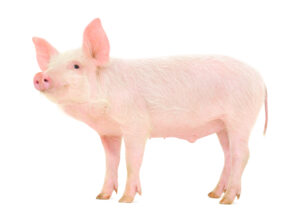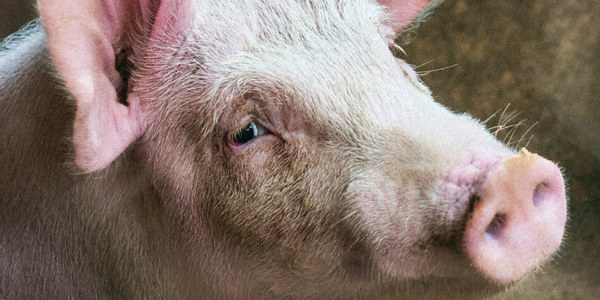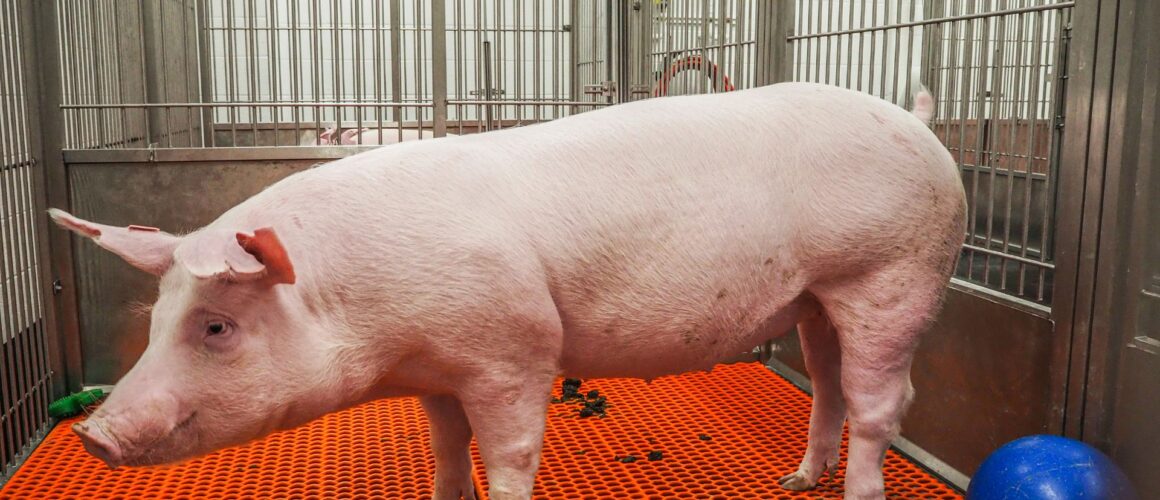Xenotransplantation is the removal of organs or living cells from one species for transplant into another.
Painful experiments on animals
Xenotransplantation research is pursued due to the shortage of available or appropriate human organs for transplant into humans. Pigs are most commonly used and considered because of their size and physiological similarity to humans, along with the ease at which researchers are able to genetically engineer their organs in an attempt to prevent species-difference organ rejection.
Animals suffer significantly during xenotransplantation research, with researchers going so far as to suggest genetic disenhancement to dimish the amount of suffering from the “inevitability of further xenotransplantation research”. They are often genetically-modified and recipient animals must have their immune system suppressed to lessen the chance of rejection.
The world’s first pig to human organ transplants took place in the US and were approved on compassionate grounds. In February 2025, the first clinical trial testing of whether pig kidneys can be safely transplanted into living people was approved by the US Food and Drug Administration (FDA). As part of the trial, which will begin later in the year, kidneys from genetically modified pigs will be transplanted into people with chronic kidney disease whose organs no longer function independently.
What is ‘genetic disenhancement’?
The process of xenotransplantation research involves “significantly shortened life expectancies, will experience pain and suffering and be subject to a degree of social and environmental deprivation.” So, in response to the 3Rs principles, researchers have proposed genetically altering an animal’s ability to feel pain or experience suffering to remove these concerns from instances such as factory farming or research and experimentation.
Xenotransplantation is not simply a scientific endeavour. It is also a social and ethical issue that poses serious questions on, for example, the appropriate use of animal bodies, the allocation of scarce health resources, animal welfare, the possibility of cross-species viral transfer (zoonosis), how risk and its potentiality should be understood and assessed, human rights, and issues of informed consent.
– Peta S. Cook (What Constitutes Adequate Public Consultation? Xenotransplantation Proceeds in Australia, 2010)
Animal-to animal xenotransplantation in Australia
In 2002 the Australian Government undertook a public consultation to determine whether or not to allow clinical trials of xenotransplantation, although the design and process of this consultation has since been questioned as it “did not facilitate meaningful public engagement and involvement.” After a lengthy consultation process, in 2004, the National Health and Medical Research Council (NHMRC) recommended that no clinical trials involving animal to human transplantation should be conducted in Australia for five years as the risk of animal to human viral transmission was not well understood.
The NHMRC reviewed their decision in December 2009 and the ban was overturned.
The National Health and Medical Research Council (NHMRC) National Statement on Ethical Conduct in Human Research 2023 (Chapter 3.4) highlights the risks associated with xenotransplantation research and additional considerations for the Human Research Ethics Committees (HRECs) tasked with approving research proposals.
Some examples of animal to animal xenotransplantation conducted in Australia with NHMRC funding include:
AFSA’s recent case study of Westmead Institute for Medical Research’s xenotransplantation where 70 piglets were used for 6 transplants into diabetic baboons. NSW
New strategies to protect pig to human renal xenografts. University of Melbourne. NHMRC funding grant 1046152 (2013-2017) $1,086,237.00
Transplantation of pig islets to treat type 1 diabetes. University of Melbourne. NHMRC funding grant 1156889 (2019 – 2023) $2,347,015.00
Bridging the gap in kidney transplantation using pigs as donors (Using humanized pigs as donors). University of Sydney. NHMRC funding grant 1120443 (2017-20) $1,452,340
Manipulating the balance of effector and regulatory T cells to promote islet xenograft. NHMRC funding grant 1061868 -2014-2018) $1,542,601.00
The below 2017 publication provides as example of baboon (cells) transplantation to mice at the University of Sydney, funded by the NHMRC: Ex vivo-expanded baboon CD39 + regulatory T cells prevent rejection of porcine islet xenografts in NOD-SCID IL-2rγ -/- mice reconstituted with baboon peripheral blood mononuclear cells
Risk of a Xenozoonotic pandemic
Many viruses can be benign in their natural host but can dangerously infect another species. AIDS (acquired immunodeficiency syndrome), BSE (Bovine spongiform encephalopathy, or Mad Cow Disease), ebolaviruses, and SARS-CoV-2, originated from cross-species contamination in which the original hosts were largely unaffected.
Porcine Endogenous Retrovirus (PERV) has already been discovered in the animals intended to be used as a source for organ donors, and the possibility of genetically altering pigs to remove the risk of PERV-related infection “is very remote“. Current tests are unable to diagnose potential xenozoonotic viruses with their unknown pathogenic behaviour, and, even if detected, the viruses are largely untreatable.
Animal viruses that are similar to human viruses, even if not currently known to be zoonotic, could infect humans with this novel access to human cells.
– Marian G. Michaels (Xenozoonoses: The Risk of Infection after Xenotransplantation, 2015)

Risk to the wider community
Not only would clinical trials be exposing the organ (or tissue) recipient to major health risks, but these risks would also be extended to the recipient’s carers, families, and the wider community.
Initially, many viruses may show no obvious signs of infection or disease (‘asymptomatic’) and may spread beyond the recipient into the general population before the consequences are evident. Researchers are unlikely to know when their patient will no longer carry a risk of transmitting the virus to another person, and will not know how many people are subsequently likely to have been exposed. Researchers themselves have acknowledged these risks.
An individual has the right to expose themselves to any risks involved in scientific research. But to further expose that risk to the wider community, who are unable to give consent, is highly unethical. The NHMRC National Statement on Ethical Conduct in Human Research 2023 states that researchers should give participants “sufficient written information” about the risks to their “close contacts or other non-participants”, which suggests the research participant themselves may be required to take responsibility for the consent of their “close contacts or other non-participants”.
In this 2022 publication – Existing Ethical Tensions in Xenotransplantation – the ethics for humans and animals is discussed.
Australia simply cannot allow research into xenotransplantation to proceed. It would cause extreme cruelty to countless animals, expose entire communities to the risk of a potential zoonotic epidemic and appears to hold little promise of resolving the problem of a shortage of human organs and tissues.
Animal-Derived Body Parts
Some animal materials are already used to treat humans, such as porcine heart valves. However, in these cases the materials are chemically preserved so they contain no living cells or tissue. This is distinct from xenotransplants, which are living cells that can perform the same functions as the organ, tissue or cells that they replace.
Some examples are:
- Materials used in ligament reconstructions can come from humans (autograph, from own body, or allograft, from human cadaver/donor) or synthetic constructs, but pig tendons are also used.
- Kangaroo tendons are proposed for human ligament xenografts.
Some new technologies are replacing animal-derived materials. For example:
- Taking pancreas cells from human cadavers and implanting them into the skin of a person with Type I diabetes
- Biosynthetic insulin made with recombinant technology in bacteria has replaced porcine-derived insulin for diabetic patients.
International Research: Recreating Artificial Organs
In the next step toward producing the answer to kidney transplantation shortages, Anthony Atala, MD, FACS, director of the Wake Forest Institute for Regenerative Medicine and the kidney research team, have been awarded the prestigious KidneyX Track 2 $1 Million Prize for work based on a 3D kidney construct platform holding the potential to accelerate the regeneration of artificial kidneys.
Researchers have also created Xeno-free 3D bioprinted liver models for toxicity assessment.
In a project in the Netherlands, collaboration with Utrecht University (Roos Masereeuw), Maastricht University (Aurelie Carlier) and UMC Utrecht (Karin Gerritsen) aims to optimise and validate an upscaled bio-artificial kidney.
Diaries of Despair
Uncaged Campaigns (now the Centre for Animals and Social Justice) has achieved a significant legal victory by obtaining the right to publish the Diaries of Despair report and confidential documents, revealing grotesque experiments conducted on primates between 1994 and 2000. These experiments, involving the transplantation of piglet organs into primates, were conducted by Imutran Ltd, a subsidiary of Novartis Pharma AG, at Huntingdon Life Sciences laboratories. The campaign aims to establish an independent inquiry to investigate government malpractice and prevent such cruelty from recurring, marking a new era after a lengthy legal battle ending in April 2003.
Articles critiquing Xenotransplantation

The death of the first person to receive a pig heart transplant is not in vain
Animal Free Research UK

First heart transplant into a human from a genetically modified pig is not only ethically wrong – it is already obsolete
Animal Free Research UK




What can you do?
Organ and tissue shortages
It is a concern held by many, including researchers, that there is simply not enough donated pancreata in the human population to treat people with Type 1 Diabetes. Increased awareness about human donation needs to be explored and funded in lieu of dangerous and unethical animal experimentation.
Information about organ and tissue donation in Australia can be found at Health Direct.gov.au
Write to the Health Minister
Write to the Minister for Health and Aged Care and urge them not to allow risky and unethical xenotransplantation research to continue.
"*" indicates required fields
